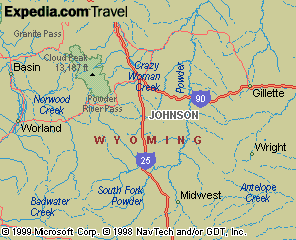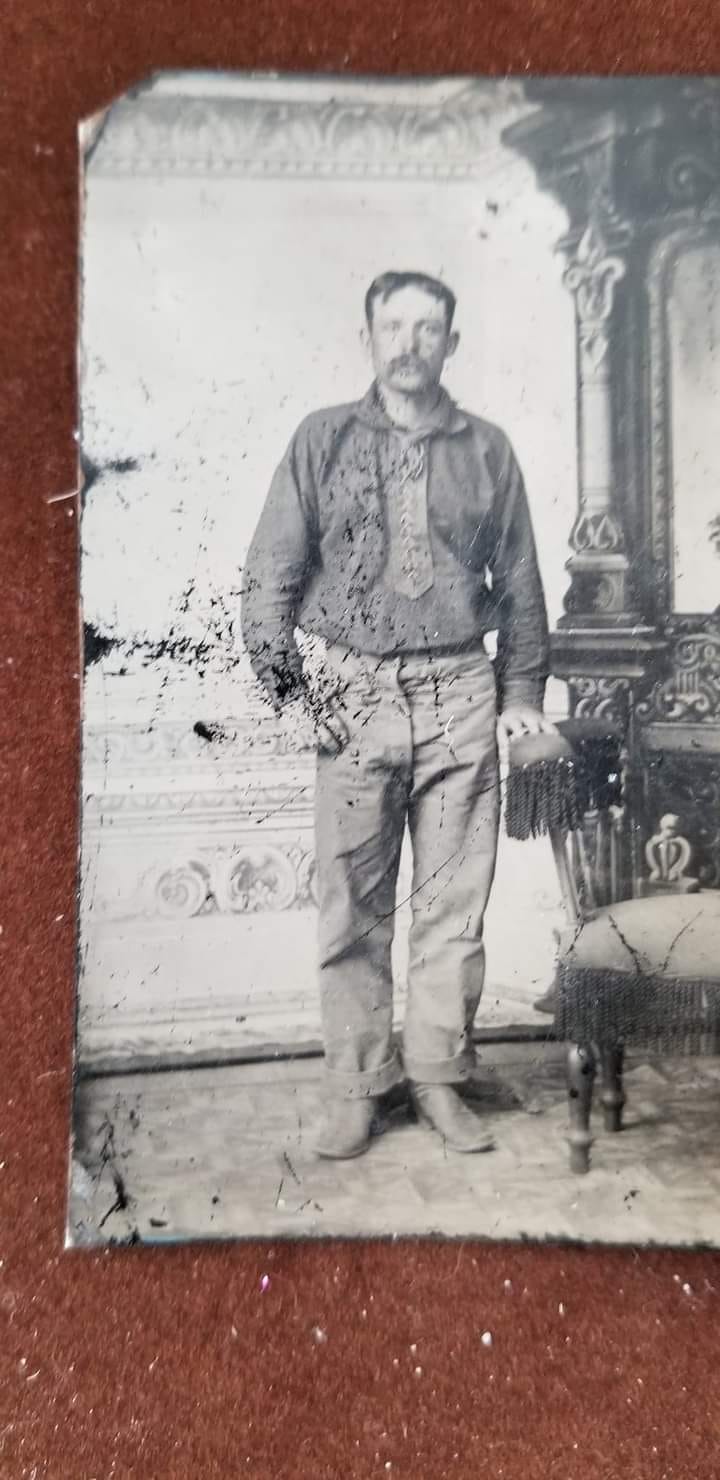![]()
HELLO! MY NAME IS REBECCA AND I AM THE COUNTY COORDINATOR FOR JOHNSON COUNTY.
PLEASE EMAIL WITH UPDATES OR NEW INFORMATION!

Map of the Johnson County
area![]()

![]()
Tom Horn was a scout, cowboy, soldier, range
detective, and Pinkerton agent before he turned to work as a hired killer in
Wyoming.
Thomas “Tom” Horn, Jr., was born near Memphis, Missouri, on
November 21, 1860, to Thomas Horn, Sr. and Mary Ann Maricha Miller Horn on their
family farm. Though he was the fifth of 12 children, he is said to have had
little companionship as a child and was severely abused by his father. He ran
away when he was just 14 years old, first making his way to Santa Fe, New
Mexico, and then to Arizona.
While little is known about this period in
Horn’s life, by the time he was 15, he was an army scout and became involved in
many Indian campaigns, including Geronimo’s surrender in 1886. During these
years, he learned Spanish. Horn would later write that he had played a
significant role in the surrender of Geronimo. Many historians doubt that, and
actual accounts of that day indicate that Tom was there solely as a
Spanish-to-English interpreter.
Pinkerton National Detective Agency
Pinkerton National Detective Agency
After the surrender of Geronimo, Horn
was discharged as a scout and reportedly mined for a while in Aravaipa, Arizona.
Again, other than his autobiography, little is known about this period of his
life. We know he was somehow involved with the Pleasant Valley War between
Arizona cattlemen and sheepmen, but we do not have a clear picture of which
side.
We also know he was an excellent roper in addition to his shooting
skills. He won a steer-roping contest in Globe, Arizona, in July 1888 and
participated in a Phoenix contest in about 1890, setting a record time of 49.5
seconds.
It was during this period he gained an interest in law
enforcement. In 1890, after proving himself during a short stint as a deputy
sheriff in Arizona, Horn joined the Pinkerton Agency as a roving gunman. Using
his gun with lethal effectiveness, Horn tracked down dozens of outlaws,
reputedly killing 17 men. He was pressured to resign by the agency, even though
he was respected as a tracker, reportedly to prevent bad publicity. Horn then
decided to go it alone as a cattle detective, turning up in Wyoming in 1894,
working for the beef barons.
Horn denied killing anyone for the
Pinkertons, although he offered the same lethal services to the cattlemen, who
were engulfed in what is known as the Johnson County War. As a “Stock
Detective,” for each cattle rustler he shot, he charged $500-$600 and quickly
proved to be a methodical manhunter and ruthless killer.
“Killing men is
my specialty. I look at it as a business proposition, and I think I have a
corner on the market.” — Tom Horn
Changing tracks in 1898, he headed to
Tampa, Florida, and was hired as a packer during the Spanish American War. That
was in April, but accounts show he was discharged by September due to
contracting Malaria. On the mend, Horn returned to Wyoming and returned to his
dealings as a “gun for hire.” Records show that he was hired to stop cattle
rustling in Brown’s Hole, Colorado, in 1900, when he was going by the name James
Hicks. He would boast in a letter, “I stopped cow stealing in one summer,” after
he killed two area ranchers and scared the rest of the rustlers out of the area.
In 1901, he was again a stock detective in Wyoming, but this would be his
last stint. In mid-July, William Nickell, the 14-year-old son of a sheep
rancher, was ambushed and killed in the Iron Mountain region, allegedly due to a
mistaken identity, as the bullet was meant for his father. About a week later,
the boy’s father, Kels Nickell, was shot in the arm and hip during another
ambush.
U.S. Deputy Marshal Joe LeFors suspected Horn’s involvement.
LeFors, wanting to gain a confession out of Horn, pretended to need someone to
take on a rustler clean-up job in Montana. During this famous interview, Horn
admitted to Nickell’s shootings, unaware that a court reporter was concealed and
taking notes. Ultimately, it would be his undoing.
Although Horn
complained at his trial that he was drunk during the interview, he would be
found guilty on October 23, 1902, with the Wyoming State Supreme Court denying
him a new trial. He was sentenced to hang, which was carried out in Cheyenne,
Wyoming, on November 20, 1903. Tom Horn was buried in Boulder, Colorado, at the
Columbia Cemetery in early December 1903.
While waiting for his
execution, Horn wrote his autobiography “Life of Tom Horn Written by Himself: A
Vindication,” published in 1904. His tales of getting Geronimo to surrender, as
well as other embellishments of his killing career, would garner him national
fame as well as critical analyses over the years.
In addition to
accusations of an unfair trial, much of the continuing controversy was based on
the book’s statements and authorship. It is alleged that the book was actually
the work of Hattie Horner Louthan and that a written copy by her had been found
in Denver, Colorado.
Regardless, Tom Horn was etched into Old West
history, immortalized in at least two motion pictures and a made-for-TV movie.
In September 1993, a mock trial in Wyoming found Horn innocent, pointing to
the fact that the original prosecution had only an alcohol-induced confession,
no witnesses, and weak evidence.
Horn was said to have committed 17
killings as a hired gunman during his lifetime.
© Kathy Alexander/Legends
of America, updated November 2022.
|
|
|
||
|
|
Please contact
the coordinator Rebecca Maloney for Johnson County, Wyoming or
Colleen
Pustola,
State Coordinator
Rebecca
Maloney,
Assistant State Coordinator
If you have
information to share with other Johnson County researchers.
Being a County or State Administrator is fun and rewarding. If you have an interest in the history of Wyoming and the genealogy of it's residents please consider it. If you think "there is no way I can do this" there are many people ready, willing and able to help you. It's not near as difficult as you might think.
©Copyrighted 1998 by Rebecca Maloney for the benefit of the WYGenWeb
Project